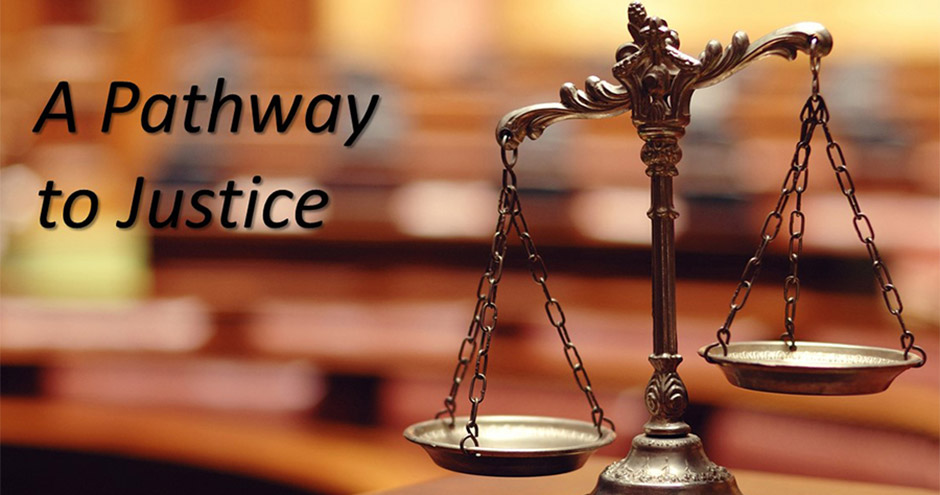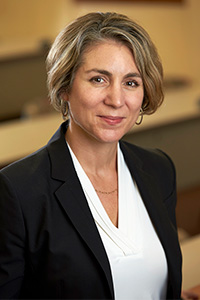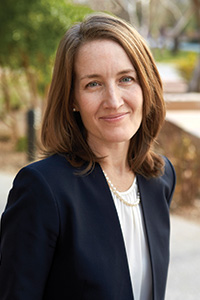A Pathway to Justice

Since its opening 21 years ago, the UNLV William S. Boyd School of Law has been guided by a singular mission: to positively impact the community well beyond the classroom walls. That mission has been accomplished through the development of a curriculum, programs, and clinics that have not only produced more than 2,500 successful alumni, but also served the legal needs of thousands of individuals throughout the state of Nevada.
But it’s the most recent program, launched a year ago, that very well may turn out to be the law school’s most impactful of all: the Misdemeanor Clinic.
While more citizens interact with misdemeanor law than any other legal classification, many often find court dates and related expenses—such as missing work, finding childcare, and, of course, potential court fees and fines—far more burdensome than the term “misdemeanor” suggests. Making matters worse, most people charged with a misdemeanor really don’t understand their rights. One of those rights? While not entitled to legal counsel, nobody is required to navigate the legal system alone. And that’s where the Misdemeanor Clinic comes into play.
Under the direction of professors Eve Hanan and Anne Traum, the clinic was unveiled last fall to help those most vulnerable in the court system overcome the legal obstacles associated with misdemeanors. And because 2L and 3L Boyd students are the ones offering pro bono assistance to those in need, the clinic also provides young lawyers the opportunity to gain valuable experience and insight into the complicated world of misdemeanor law.

Besides working directly with their clients, Boyd students involved with the Misdemeanor Clinic also interact with investigators. That interaction might even include visiting the scene of incidents, taking photos, and/or interviewing witnesses. It’s the type of hands-on experience that’s critical to law students before they embark on careers in which they likely will have heavy caseloads, making it difficult to devote as much time to a single case like they can in the Misdemeanor Clinic.
“With the clinic, students can really work up a case and strategize to get a fair disposition. It’s hard to do that in a world of high caseloads,” Hanan says. “This is the type of work that occurs in major felony cases, but cases with lower stakes and issues can be just as complicated. Anne and I both have high caseload experience, so this program gives us the opportunity to share techniques and best practices with the students, who then apply those to these cases.”
A key component of the Misdemeanor Clinic is giving students face time in a courtroom. But perhaps more important is what the program asks of students as they work to build their case prior to going before a judge—often, Las Vegas Justice of the Peace Diana Sullivan, whose courtroom is home base for the clinic.

The process begins with students obtaining a police report and statement of charges. Then they ask themselves, “What do we do next?” The answer always involves talking to the clients to better understand their specific predicament—conversations that often lead to revelations that can very much work in a defendant’s favor.
"We’ve had instances where students knew things that nobody else knew,” Hanan says. “In one case, we set up a meeting with the assistant district attorney and shared that information early on. The assistant DA reviewed the information and discussed it with a supervisor before ultimately agreeing to dismiss the case before the next hearing was ever held.”
Misdemeanors constitute what many perceive as “minor” violations, such as parking, traffic and trespassing citations, petty theft, simple assault, vandalism, etc. But these relatively minor violations can lead to major consequences, including conviction and substantial fines. Even modestly time-consuming misdemeanor cases can significantly affect a person’s ability to work, drive, or care for family members.
For those who can’t afford legal representation—or aren’t even aware that they’re allowed to secure counsel—unresolved misdemeanors can result in significant personal trauma. Alleviating, if not eliminating, that trauma is the Misdemeanor Clinic’s primary objective. While the program is only a year old, Boyd students have already secured eye-opening positive outcomes for clients. Among them:
- Dismissal of charges, stemming from an extended traffic stop, of lying to a police officer
- Dismissal, on the day of trial, of a battery charge against a client who was actually the victim of road rage
- Dismissal of charges against a client whose identity was stolen by the real perpetrator
- Withdrawal of a guilty plea for a client whose previously retained counsel entered a guilty plea without the client’s knowledge or permission
Of course, not every positive outcome is about dismissals. Some defendants understand they were in the wrong and are willing to admit as much. But the resulting penalties and/or sanctions often might not fit the crime, or may be difficult or even impossible for the defendant to meet. And if the defendant fails to honor a court ruling, regardless of the reason, a misdemeanor could turn into an arrest warrant, which can lead to even more legal roadblocks.
So in cases where a guilty plea is entered, it’s critical that defendant get a resolution that he or she can actually fulfill. Which is why the Misdemeanor Clinic, as a matter of practice, maintains contact with clients even after cases are settled to ensure that those clients are living up to the agreed-upon resolution.
“We’re working for an outcome that doesn’t result in unanticipated jail time later,” Hanan says. “A person without counsel would usually accept what the judge offers. Let’s say it’s a fine. Later, if that person can’t pay the fine, they’re likely to be picked up on a warrant and spend a weekend or longer in jail. Really, the right to counsel is a missing piece of the [misdemeanor] puzzle.”
Adds Traum: “Our No. 1 goal is to avoid a conviction. And the other goal is to get the most suitable outcome.”
Marc Kustner and Alexis Wendl, who both graduated from Boyd School of Law this past spring, were among the six students who participated in the initial Misdemeanor Clinic in the fall semester of the 2018-19 academic year. Both Kustner and Wendl praised the clinic for providing them vital real-world legal experience, but more importantly, for allowing them to serve defendants who were in dire need of assistance.
“We were working with individuals who would be looking at jail sentences, and they weren’t granted an attorney,” Kustner says. “We also dealt with [individuals who] weren’t in a financial position to hire an attorney or had no idea what their options were. They didn’t know that they could say ‘no’ to these deals. They didn’t know they had options. They just thought they had to accept it.
“Some people do want to accept responsibility [for misdemeanor infractions], but for us students, it was making sure it was the proper level of accountability. For somebody in a tough financial position, that meant working out a community service option instead of [paying] a monetary fee. They’re still accepting accountability, but this provides a realistic option for what [the defendants] can handle. It was neat getting to help those people.”
It’s invaluable experience, particularly right before students graduate and launch a legal career that will feature countless attorney-client relationships.
“The types of cases we got to handle and the kind of work we were able to do—interviewing clients and witnesses, watching body-cam footage, working with investigators, and going over evidence—was unique,” Wendl says. “But the best part, without question, was actually helping clients. These are real people with real concerns. Having the opportunity to speak in court on behalf of my client, I felt like an attorney advocating for my client. Because of the clinic, I will have an advantage going forward into my litigation career. It’s a definite leg up.”
As Wendl, Kustner and their professors all attested, that leg up was made possible through the generosity of time and assistance from the Misdemeanor Clinic’s community partners: Judge Sullivan and her staff; the district attorney’s office, specifically Deputy District Attorney Alex Chen and his team; and the public defender’s office, specifically Chief Public Defenders Jeffrey Rue and Julia Murray and the training division team.
“We relied on all of them to give us the information to get us to the right people,” Traum says. “They were incredibly cooperative.”
Thanks to that established partnership, as well as several success stories from the clinic’s inaugural year, Hanan and Traum enter year two with confidence that the program they created is indeed making a difference for Clark County’s citizens. And at least one recent Boyd alu